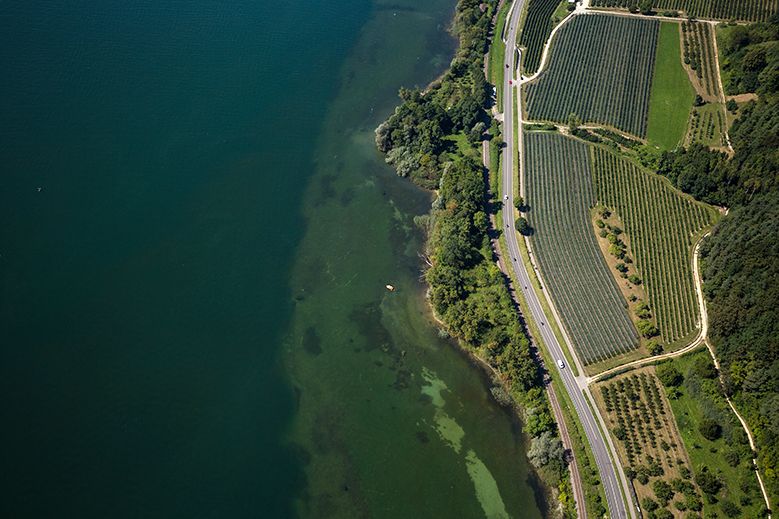The consequences of climate changes for water levels, ecosystems and sectors that depend on water, are presented in a new report by researchers from the Climate Service Center Germany.

Changes in the water level of rivers and lakes due to climate change have serious consequences – not only for agriculture. Credit: iStock
The authors include Stefan Hagemann from the Max Planck Institute for Meteorology in Hamburg.
Climate change not only involves rising temperatures – it also causes changes in the hydrological balance. Precipitation, evaporation and groundwater formation will follow a new rhythm in future.
People still have very vivid memories of the record-breaking summer of 2003: During a heat wave in the first half of August, temperatures in some locations in Germany exceeded 40 degrees Celsius, and many people suffered from the effects of the extreme heat.
Because little rain had fallen over the course of the year, the water levels in rivers and reservoirs fell in late summer, drastically in some cases. Shipping had to be halted on some sections of the rivers Elbe and Danube. Nuclear power plants reduced their output because they had insufficient cooling water available to them. Plants withered in the fields and the risk of forest fires increased.
Longer periods of low precipitation
The water levels in the major rivers will change as a result of this development, the authors report. Previously, the water level in most flowing water bodies was highest in spring when the snow melts and lowest in summer or autumn. The authors assume that, overall, the periods with low water levels will increase in duration until the end of the century.
This has impacts on inland navigation, for example. Hagemann and his colleagues expect that the navigability of the Elbe River in summer will deteriorate from the year 2050, particularly in the Federal States of Saxony, Saxony-Anhalt and Thuringia.
"Low water will arrive earlier, last longer and fall below the usual levels," says the report. In contrast, the researchers were unable to identify any trend for the Rhine, and the Danube water level will probably reach its lowest point in late summer rather than autumn – due to the earlier snowmelt.
The falling water levels in summer also affect the energy supply, which requires large volumes of river water for cooling. If there is not enough cooling water available, production at nuclear power plants must first be reduced and then entirely halted.
Another problem: Water temperatures in German rivers are also rising due to climate change, on average up to two degrees by 2100 and this also creates a difficulty for cooling in nuclear power plants. Because high water temperatures and low water levels will arise more often than before, the power station output will fall during summer months in the 40 years to come, write the GERICS researchers.
Agriculture will also have to adapt to more frequent, longer and more intensive periods of drought in summer. In North Rhine-Westphalia, for example, the number of days on which fields have to be irrigated, will double from 30 to 60 by the year 2100.
According to the report, the flood risk will also increase – among other reasons because less precipitation will fall in the mountains in the form of snow. Hence, the rainwater that falls at low altitudes is transported away by the rivers and does not remain standing until spring. It is difficult, however, to produce more detailed forecasts for floods as their frequency depends not only the climate but also on many other factors, for example land use and reservoirs.
Ecological community in bogs, marshes and lakes under stress
Hagemann and the other authors predict that freshwater ecosystems will come under particular pressure. "The ecological balance of terrestrial water systems has already been dramatically altered by human activity," states the report.
Changes in land use, population growth and environmental pollution pose a threat to the communities of organisms that live in bogs, marshes, lakes and rivers. Further stress factors will be added to these through climate change: falling groundwater levels cause lakes and small streams to dry out and higher water temperatures exacerbate existing problems arising from the overuse of fertilisers and promote algal bloom.
Non-native species may also proliferate more than before. It is very difficult to estimate the precise scale of the consequences as ecosystems often react unpredictably to environmental changes.
Climate change also affects the groundwater, from which most of the drinking water is extracted. However, the German population will not face water shortages in the future. According to the study, water supplies throughout the country will be sufficient.
Read more: Phys.org
Read and download study (in German):
Der Einfluss des Klimawandels auf die terrestrischen Wassersysteme in Deutschland
Der Einfluss des Klimawandels auf die terrestrischen Wassersysteme in Deutschland


No comments:
Post a Comment